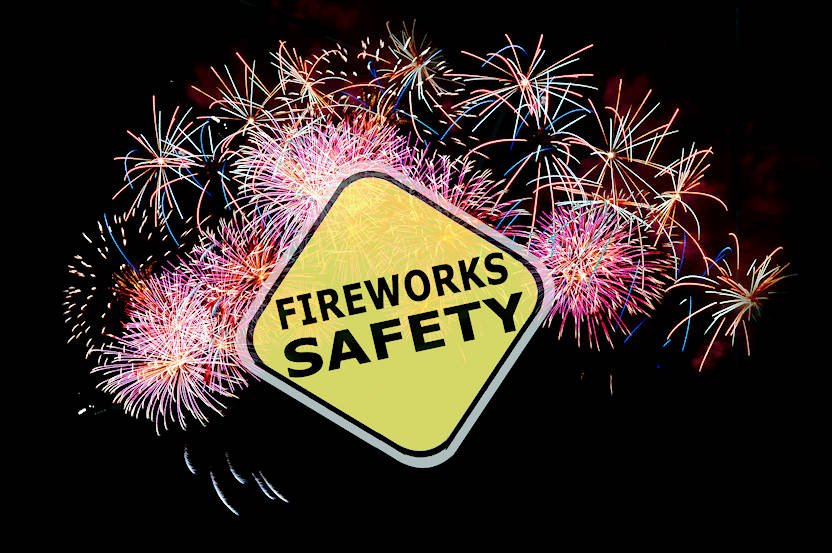And Another 2020 Challenge ... MORE Fireworks

2020 is a year that keeps on giving ...
(and not in a good way for most)
A 2nd lockdown looms, with Bonfire Night, Fireworks Night (week??), just around the corner, and group displays cancelled, it's a sure bet that garden firework displays will feature loud and popular this year - and many will see the Firework Weekend as an opportunity to let off a little steam.
Danger
Most animal owners know this is a very stressful time for the animals in their care - as well as being a dangerous time for wildlife.
The problems arise from the sudden, loud (and often continual) bangs, sudden flashes, and of course, many bonfires, smoke and firework debris. And whilst recent rain has dampened most areas, the risk of fire from rogue fireworks or stray bonfire sparks are also a danger.
Whilst the odd loud bang can be tolerated, for many, the issue is the longevity of it all. Often from dusk to midnight and beyond, and over many days too.
Preparation
If you can, it's worth checking (from a safe distance, obviously!) whether your neighbours are planning to have their own firework night - and if so, when. Mentioning your own pets and wanting to ensure their safety is also a good idea, so your neighbours can understand the reason for your worries.
Of course, within current UK laws and COVID-19 restrictions, people have the right to hold their own household firework nights, and many will enjoy the occasion (particularly in light of current events), so mutual understanding and communication is the best way forward for an enjoyable, and safe, time for all.
Helping your Little Ones
There are many things you can do to help your little ones (and wildlife) to cope with the fireworks this year. Here's a reminder of our top tips - and if you know of anything else that has helped your little ones, do let us know, so we can share with others.
-
For those living outside, block out the firework flashes - accommodation can be covered (but leave good airflow), and by keeping outside lights on where possible, any flashes making it through the covers will be further reduced in intensity.
-
An easy way of giving light outside is to use a battery operated light or torch you don’t have an outside light where your little ones are.
-
If your little ones are indoors, close windows and curtains to reduce sounds and flashes.
-
Help mask loud noises by having a radio or TV on (mind all the wires, of course, or use a battery operated radio). A sudden loud bang is more scary in the quiet, less so when there are other sounds around.
-
There are a number of calming products available - Pet Remedy works with most animals, including rabbits, guinea pigs, horses and iguanas!
-
Heat pads will help them feel comfy and cosy if they’re outside. Give them space away from the heat pad too, so they can choose what they prefer.
-
If the hutch can be relocated temporarily in the garage overnight (assuming no car fumes etc!), or in a shed/outhouse then this will help reduce the effect of sudden noise and lights.
-
Some animals, such as rabbits, can go into gut stasis when highly stressed; it is wise to have emergency vet out of hours phone numbers handy in case you need to call.
-
Having products such as Recovery/Critical care on hand for rabbits and others is a wise precaution also.
-
Provide an escape box for somewhere to hide in if it all gets too much for outside animals such as rabbits and guinea pigs. Fill the box with lots of hay and straw, so they can snuggle down and hide.
-
Provide new toys and fresh hay to forage around in - something new to investigate can be a great distraction!
-
Reassure them, and be with them through the worst if you can; a familiar, calming voice and face will help!
-
Whilst it’s great to spend time reassuring them, don’t be tempted to overload them with unhealthy treats - an overload of treats may help to trigger a digestive upset if they are already quite stressed. Plus it will reduce their desire to eat that all-important hay!
-
Have a word with your neighbours if you’re able to - if you know when they’re likely to have their fireworks, you can focus your attention on the ‘critical’ evenings.
-
If displays are happening very close, check the garden for rogue fireworks - they can be a nibble or fire hazard!
And Finally ..
If you're worried about your Little Ones in any way, or they are showing signs of stress such as a loss of appetite, speak to your vet as soon as you can - getting help early can often make all the difference.
Take some time to make plans for what's ahead (there WILL be fireworks in some shape or form this year).

